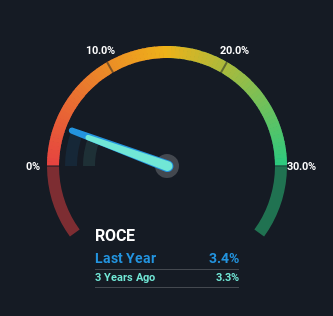- South Korea
- /
- Specialty Stores
- /
- KOSDAQ:A053280
Here's What's Concerning About YES24Ltd's (KOSDAQ:053280) Returns On Capital
If we want to find a potential multi-bagger, often there are underlying trends that can provide clues. One common approach is to try and find a company with returns on capital employed (ROCE) that are increasing, in conjunction with a growing amount of capital employed. Put simply, these types of businesses are compounding machines, meaning they are continually reinvesting their earnings at ever-higher rates of return. In light of that, when we looked at YES24Ltd (KOSDAQ:053280) and its ROCE trend, we weren't exactly thrilled.
What Is Return On Capital Employed (ROCE)?
For those who don't know, ROCE is a measure of a company's yearly pre-tax profit (its return), relative to the capital employed in the business. To calculate this metric for YES24Ltd, this is the formula:
Return on Capital Employed = Earnings Before Interest and Tax (EBIT) ÷ (Total Assets - Current Liabilities)
0.034 = ₩7.2b ÷ (₩388b - ₩176b) (Based on the trailing twelve months to June 2024).
So, YES24Ltd has an ROCE of 3.4%. In absolute terms, that's a low return and it also under-performs the Specialty Retail industry average of 8.0%.
See our latest analysis for YES24Ltd

Historical performance is a great place to start when researching a stock so above you can see the gauge for YES24Ltd's ROCE against it's prior returns. If you're interested in investigating YES24Ltd's past further, check out this free graph covering YES24Ltd's past earnings, revenue and cash flow.
How Are Returns Trending?
In terms of YES24Ltd's historical ROCE movements, the trend isn't fantastic. To be more specific, ROCE has fallen from 10% over the last five years. However it looks like YES24Ltd might be reinvesting for long term growth because while capital employed has increased, the company's sales haven't changed much in the last 12 months. It may take some time before the company starts to see any change in earnings from these investments.
On a side note, YES24Ltd has done well to pay down its current liabilities to 46% of total assets. So we could link some of this to the decrease in ROCE. What's more, this can reduce some aspects of risk to the business because now the company's suppliers or short-term creditors are funding less of its operations. Since the business is basically funding more of its operations with it's own money, you could argue this has made the business less efficient at generating ROCE. Either way, they're still at a pretty high level, so we'd like to see them fall further if possible.
What We Can Learn From YES24Ltd's ROCE
Bringing it all together, while we're somewhat encouraged by YES24Ltd's reinvestment in its own business, we're aware that returns are shrinking. Although the market must be expecting these trends to improve because the stock has gained 65% over the last five years. But if the trajectory of these underlying trends continue, we think the likelihood of it being a multi-bagger from here isn't high.
If you want to know some of the risks facing YES24Ltd we've found 3 warning signs (2 shouldn't be ignored!) that you should be aware of before investing here.
If you want to search for solid companies with great earnings, check out this free list of companies with good balance sheets and impressive returns on equity.
New: Manage All Your Stock Portfolios in One Place
We've created the ultimate portfolio companion for stock investors, and it's free.
• Connect an unlimited number of Portfolios and see your total in one currency
• Be alerted to new Warning Signs or Risks via email or mobile
• Track the Fair Value of your stocks
Have feedback on this article? Concerned about the content? Get in touch with us directly. Alternatively, email editorial-team (at) simplywallst.com.
This article by Simply Wall St is general in nature. We provide commentary based on historical data and analyst forecasts only using an unbiased methodology and our articles are not intended to be financial advice. It does not constitute a recommendation to buy or sell any stock, and does not take account of your objectives, or your financial situation. We aim to bring you long-term focused analysis driven by fundamental data. Note that our analysis may not factor in the latest price-sensitive company announcements or qualitative material. Simply Wall St has no position in any stocks mentioned.
About KOSDAQ:A053280
Slight risk with mediocre balance sheet.
Market Insights
Community Narratives



